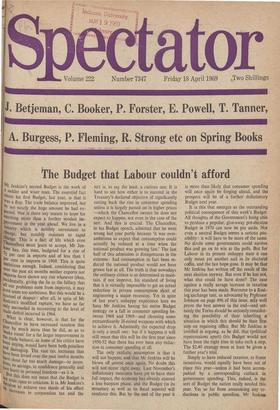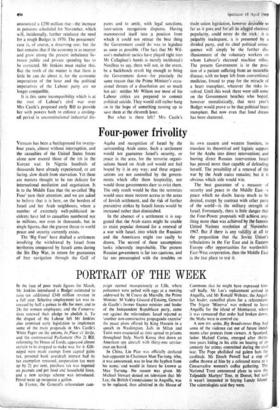The Budget that Labour couldn't afford
has, this time, budgeted for a rise of 4 per cent in mtports and of less than 1 Per cent in imports in 1969. This is quite ambitious enough. Indeed, considering that over the past six months neither exports nor imports have shown any rise whatever (thus, incidentally, giving the lie to the fallacy that all our problems stem from imports), it may even seem too ambitious. But this would be a counsel of despair: after all, in spite of Mr lenkins's modified rapture, we have so far only succeeded in recovering to the level of Fade deficit incurred in 1964. What is clear, however, is that for the chancellor to have increased taxation this Year by much more than he did, so as to make room' for a far larger improvement in the trade balance, as some of his critics have and Urging, would have been both pointless have damaging. The vast tax increases that have been levied over the past twelve months t,ave done far too much damage—to incen- tives, to savings, to confidence generally and `"°., least) to personal freedom—as it is. SET is, to say the least, a curious one. It is hard to see how either is to succeed in the Treasury's' declared objective of significantly cutting back the rise in consumer spending unless it is largely passed on in higher prices —which the Chancellor swears he does not expect to happen, not even in the case of the SET. And this is crucial. The Chancellor, in his Budget speech, admitted that he went wrong last year partly because `it was over- ambitious to expect that consumption could actually be reduced at a time when the national product was growing fast.' The last half of this admission is disingenuous in the extreme : had consumption in fact been re- duced the national product would not have grown fast at all. The truth is that nowadays the ordinary citizen is so determined to main- tain. if not improve, his standard of living that it is virtually impossible to get an actual reduction in private consumption short of engineering a major recession. Yet in spite of last year's unhappy experience here we have Mr Jenkins basing his entire Budget strategy on a fall in consumer spending be- tween 1968 and 1969—and choosing some extraordinarily ill-suited weapons with which to achieve it. Admittedly the expected drop is only a small one: but if it happens it will still mean that this will be the first year since 1950-52 that there has ever been any reduc- tion in consumer spending at all. is more than likely that consumer spending will once again be forging ahead, and the prospect will be of a further deflationary Budget next year. It is this that emerges as the outstanding political consequence of this week's Budget. All thoughts of the Government's being able to produce a popular, give-away pre-election Budget in 1970 can now be put aside. Not even a neutral Budget seems a serious pos- sibility : it will have to be more of the same. No doubt some governments could survive this and go on to win at the polls. But for Labour in its present unhappy state it can only mean yet another nail in its electoral coffin, and the last hope gone. It may be that Mr Jenkins has written off the result of the next election anyway. But even if he has not, what else could he have done? The case against a really savage increase in taxation this year has been made. Recourse to a float- ing exchange rate, as advocated by Prkfessor Johnson on page 496 of this issue, may well prove the best answer in the end—and cer- tainly the Tories should be seriously consider- ing the possibility of their inheriting a situation in which this should be their first step on regaining office. But Mr Jenkins is justified in arguing, as he did, that (political repercussions apart) this Budget would not have been the right time to take such a step. The $2.40 strategy must at least be given a further year's trial. announced a £250 million rise—the increase in pensions scheduled for November, which will, incidentally, further reinforce the need for a tough Budget in 1970. The pensioners' case is, of course, a deserving one; but the fact remains that if the economy is to recover, and grow strong the present imbalance 'be- tween public and private spending has to be corrected. Mr Jenkins must realise this. But the truth of the matter is that there is little he can do about it, for the economic imperatives of the hour and the political imperatives of the Labour party are no longer compatible.
It is this same incompatibility which is at the root of Labour's civil war over Mrs Castle's proposed early Bill to provide her with powers both to enforce a cooling- off period in unconstitutional industrial dis- putes and to settle, with legal sanctions, inter-union recognition disputes. Having manoeuvred itself into . a position from which it could not retreat the best thing the Government could do was to legislate as soon as possible. (The fact that Mr Wil- son's maladroit tactics have played right into Mr Callaghan's hands is merely incidental.) Needless to say, there will not, in the event, be a backbench revolt big enough to bring the Government down—for precisely the same reason that the Prime Minister's occa- sional threats of a dissolution are so much hot air: neither Mr Wilson nor most of his Labour critics are prepared to commit political suicide. They would still rather hang on in the hope of something turning up to save them at the eleventh hour.
But what is there left? Mrs Castle's trade union legislation, however desirable so far as it goes and for'all its alleged electoral popularity, could never do the trick: it is palpably inadequate, it is presented by a divided party, and its chief political conse- quence will simply be the further dis- illusionment of the voluntary workers on whom Labour's electoral machine relies. The present Government is 'in the posi- tion of a patient suffering from an incurable disease, with no hope left from conventional medicine, forced to pray for the miracle of a heart transplant, whatever the risks in- volved. Until this week there were still some on the Government benches who hoped, however unrealistically, that next year's Budget would prove to be that political heart transplant. But now even that fond dream has been shattered.











































 Previous page
Previous page